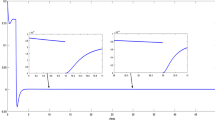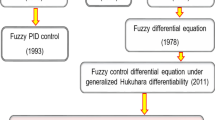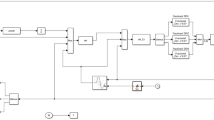Abstract
This paper focuses on the stability analysis and the stabilization problem for a discrete-time Markovian jump fuzzy systems (MJFSs) with time-varying delays and partially known transition probabilities. These systems are made more general, by relaxing the traditional assumption in MJFSs that all the transition probabilities must be completely known. The class of MJFSs considered is described by a fuzzy model composed of two levels: a crisp level that represents the jumps and a fuzzy level that represents the system nonlinearities. Based on a stochastic Lyapunov function, stability and stabilization conditions for the MJFSs with time-varying delays are derived in both the case of completely known transition probabilities and the case of partially known transition probabilities. The derived conditions are represented in terms of linear matrix inequalities (LMIs). Finally, a numerical example is used to illustrate the effectiveness of the proposed theorem.
Similar content being viewed by others
References
Y. Ji and H. J. Chizeck, “Controllability, stabilizability, and continuous-time Markovian jump linear quadratic control,” IEEE Trans. on Automatic Control, vol. 35, no 7, pp. 777–788, 1990.
J. Xiong, J. Lam, H. Gao, and D. W. Ho, “On robust stabilization of Markovian jump systems with uncertain switching probabilities,” Automatica, vol. 41, no 5, pp. 897–903, 2005.
N. S. D. Arrifano and V. A. Oliveira, “State feedback fuzzy-model based control for Markovian jump nonlinear systems,” Controle Automacao: Revista da Sociedade Brasileira de Automacao, vol. 15, no. 3, pp. 279–290, 2004.
S. Natache, N. S. D. Arrifano, and V. A. Oliverira, “Robust H ∞ fuzzy control approach for a class of Markovian jump nonlinear systems,” IEEE Trans. on Fuzzy Systems, vol. 13, no. 6, pp. 738–754, 2006.
H. N. Wu and K. Y. Cai, “Robust fuzzy control for uncertain discrete-time nonlinear Markovian jump systems without mode observations,” Information Science, vol. 177, no. 6, pp. 1509–1522, 2007.
Y. Y. Cao and P. M. Frank, “Analysis and synthesis of nonlinear time-delay systems via fuzzy control approach,” IEEE Trans. on Fuzzy Systems, vol. 8, no. 2, pp. 200–211, 2000.
Y. Y. Cao and P. M. Frank, “Stability analysis and synthesis of nonlinear time-delay systems via linear Takagi-Sugeno fuzzy models,” Fuzzy Sets and Systems, vol. 124, no. 2, pp. 213–229, 2001.
E. K. Boukas, Stochastic Switching Systems: Analysis and Design, Birkhauser, Basel, Berlin, 2005.
O. L. V. Costa, M. D. Fragoso, and R. P. Marques, Discrete-time Markovian Jump Linear Systems, Springer-Verlag, London, 2005.
H. J. Kushner, Stochastic Stability and Control, Academic, New York, 1967.
P. Gahinet, A. Nemirovski, A. J. Laub, and M. Chilali, LMIcontrol Toolbox, Math Works, Natick, MA, 1995.
J. Daafouz, P. Riedinger, and C. Iung, “Stability analysis and control synthesis for switched systems: a switched Lyapunov function approach,” IEEE Trans. on Automatic Control, vol. 47, no. 11, pp. 1883–1887, 2002.
J. Daafouz, P. Riedinger, and C. Iung, “Transition probability bounds for the stochastic stability robustness of continuous and discrete-time Markovian jump linear systems,” Automatica, vol. 42. no. 12, pp. 2159–2168, 2006.
K. Tanaka and M. Sano, “A robust stabilization problem of fuzzy control systems and its application to backing up control of a truck-trailer,” IEEE Trans. on Fuzzy Systems, vol. 2, no. 2, pp. 119–134, 1994.
B. Ding, H. Sun, and P. Yang, “Further studies on LMI-based relaxed stabilization conditions for nonlinear systems in Takagi-Sugeno’s form,” Automatica, vol. 42, no. 3, pp. 503–508, 2006.
B. Chen and Xi. Liu, “Fuzzy Guaranteed cost control for nonlinear systems with time-varying delay,” IEEE Trans. on Fuzzy Systems, vol. 13, no. 2, pp. 238–249, 2005.
T. M. Guerra and L. Vermeiren, “LMI-based relaxed non quadratic stabilization conditions for nonlinear systems in the Takagi-Sugeno’s form,” Automatica, vol. 40, no. 5, pp. 823–829, 2004.
Y. Zhang, S. Xu, Y. Zou, and J. Lu, “Delay-dependent robust stabilization for uncertain discrete-time fuzzy Markovian jump systems with mode-dependent time delays,” Fuzzy Sets and Systems, vol. 164, no. 1, pp. 66–81, 2011.
Y. He, Q. G. Wang, L. Xie, and C. Lin, “Further improvement of free-weighting matrices technique for systems with time-varying delay,” IEEE Trans. on Automatic Control, vol. 52, no. 2, pp. 293–298, 2007.
H. Gao, Z. Fei, J. Lam, and B. Du, “Further results on exponential estimates of Markovian jump systems with mode-dependent time-varying delays,” IEEE Trans. on Automatic Control, vol. 56, no. 1, pp. 223–229, 2011.
S. Wen, Z. Zeng, and T. Huang, “Reliable H ∞ filter design for a class of mixed-delay Markovian jump systems with stochastic nonlinearities and multiplicative noises via delay-partitioning method,” International Journal of Control and Automation System, vol. 10, no. 4, pp. 711–720, 2012.
N. Chaibi and E. H. Tissir, “Delay dependent robust stability of singular systems with time-varying delay,” International Journal of Control and Automation System, vol. 10, no. 3, pp. 632–638, 2012.
Author information
Authors and Affiliations
Corresponding author
Additional information
Recommended by Editorial Board member Shengyuan Xu under the direction of Editor Hyungbo Shim.
This work was supported by the National Research Foundation of Korea (NRF) grant funded by the Korea government (MEST) (No.:2012014088) and the Human Resources Development program( No. 20124030200040) of the Korea Institute of Energy Technology Evaluation and Planning (KETEP) grant funded by the Korea government Ministry of Knowledge Economy.
Min Kook Song received his B.S. and M.S. degrees in Electrical and Electronic Engineering from Yonsei University, Seoul, Korea, in 2006 and 2007, respectively. He is currently working toward a Ph.D. degree in Electrical and Electronic Engineering at the Department of Electrical and Electronic Engineering, Yonsei University, Seoul, Korea. His research interests include fuzzy control and filtering, nonlinear control, networked control system, neural networks, and genetic algorithms.
Jin Bae Park received his B.E. degree in Electrical Engineering from Yonsei University, Seoul, Korea, and his M.S. and Ph.D. degrees in Electrical Engineering from Kansas State University, Manhattan, in 1977, 1985, and 1990, respectively. Since 1992, he has been with the Department of Electrical and Electronic Engineering, Yonsei University, Seoul, Korea, where he is currently a professor. His research interests include robust control and filtering, nonlinear control, intelligent mobile robot, fuzzy logic control, neural networks, and genetic algorithms. He served as Editor-in-Chief of the International Journal of Control, Automation, and Systems (IJCAS) (2006–2010) and has been serving as the President of the Institute of Control, Robotics, and Systems (ICROS) in 2013.
Young Hoon Joo received his B.S., M.S., and Ph.D. degrees in Electrical Engineering from Yonsei University, Seoul, Korea, in 1982, 1984, and 1995, respectively. He worked with Samsung Electronics Company, Seoul, Korea, from 1986 to 1995, as a project manager. He was with the University of Houston, Houston, TX, from 1998 to 1999, as a visiting professor in the Department of Electrical and Computer Engineering. He is currently a professor in the Department of Control and Robotics Engineering, Kunsan National University, Korea. His major interest is mainly in the field of intelligent robot, intelligent control, and human-robot interaction. He served as President for Korea Institute of Intelligent Systems (KIIS) (2008–2009) and is serving as Editor for the International Journal of Control, Automation, and Systems (IJCAS) (2008-present) and is serving as the Vice-President for the Korean Institute of Electrical Engineers (KIEE) (2012-present).
Rights and permissions
About this article
Cite this article
Song, M.K., Park, J.B. & Joo, Y.H. Stability and stabilization for discrete-time Markovian jump fuzzy systems with time-varying delays: Partially known transition probabilities case. Int. J. Control Autom. Syst. 11, 136–146 (2013). https://doi.org/10.1007/s12555-011-9112-y
Received:
Revised:
Accepted:
Published:
Issue Date:
DOI: https://doi.org/10.1007/s12555-011-9112-y




